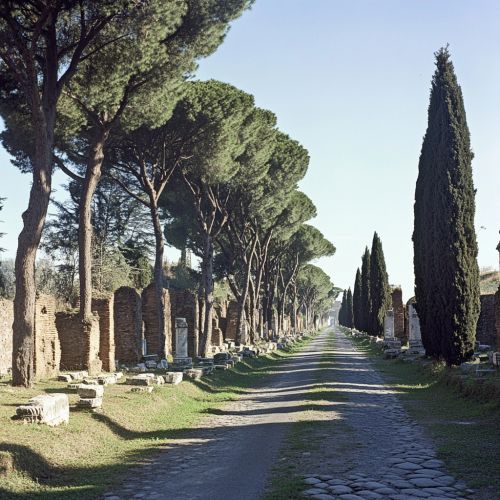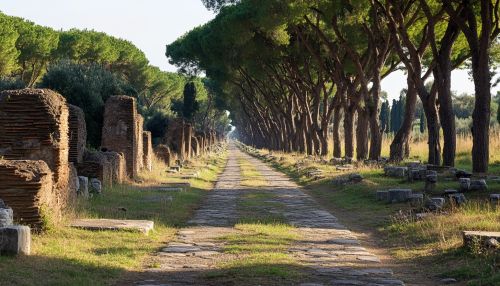Claudia (gens)
Overview
The Claudia gens was one of the most prominent and influential patrician families in ancient Rome. Originating from Sabine roots, the gens played a significant role in Roman politics, military, and society from the early Republic through the Imperial period. Members of the Claudia gens held numerous consulships, military commands, and other high offices, contributing to the shaping of Roman history and governance.
Origins and Early History
The Claudia gens traces its origins to the Sabine people, an Italic tribe that inhabited central Italy. According to ancient sources, the founder of the gens was Attius Clausus, a Sabine noble who migrated to Rome in the early 5th century BCE. Upon his arrival, he was granted Roman citizenship and adopted the name Appius Claudius. His descendants became known as the Claudii, and they quickly rose to prominence in Roman society.
Branches of the Claudia Gens
The Claudia gens was divided into several branches, each distinguished by their cognomina. The most notable branches included the Claudii Pulchri, Claudii Nerones, and Claudii Marcelli.
Claudii Pulchri
The Claudii Pulchri were one of the most influential branches of the gens. The cognomen "Pulcher" means "handsome" in Latin, and this branch produced several notable figures, including Appius Claudius Pulcher, a prominent statesman and censor in the 4th century BCE.
Claudii Nerones
The Claudii Nerones were another significant branch, with the cognomen "Nero" meaning "strong" or "vigorous." This branch included Tiberius Claudius Nero, the father of the future Emperor Tiberius, and Nero Claudius Drusus, a distinguished general and brother of Emperor Tiberius.
Claudii Marcelli
The Claudii Marcelli were known for their military achievements. The most famous member of this branch was Marcus Claudius Marcellus, a five-time consul and celebrated general who played a crucial role in the Second Punic War.
Political Influence
The Claudia gens wielded considerable political influence throughout the Republic and into the Imperial period. Members of the gens held numerous consulships, censorships, and other high offices. They were known for their staunch support of the patrician class and often opposed the plebeian reforms.
Consulships
The Claudii held the consulship more than any other gens in Roman history. Notable consuls included Appius Claudius Caecus, who served as consul in 307 and 296 BCE and was known for his extensive public works, including the construction of the Appian Way and the Aqua Appia.
Censorships
Several members of the Claudia gens served as censors, a prestigious office responsible for maintaining the census, overseeing public morals, and conducting public works. Appius Claudius Caecus is perhaps the most famous censor from the gens, known for his reforms and infrastructure projects.
Military Achievements
The Claudia gens produced numerous military leaders who played pivotal roles in Rome's expansion and defense. Their contributions to Roman military history are significant, with several members achieving notable victories and commanding large armies.
Appius Claudius Caudex
Appius Claudius Caudex was a notable military leader who commanded Roman forces during the First Punic War. He is credited with the successful invasion of Sicily, which marked the beginning of Rome's expansion beyond the Italian peninsula.
Nero Claudius Drusus
Nero Claudius Drusus, also known as Drusus the Elder, was a distinguished general who led successful campaigns in Germania. He was instrumental in extending Roman control into the Germanic territories and establishing the provinces of Germania Inferior and Germania Superior.
Cultural Contributions
The Claudia gens also made significant contributions to Roman culture, particularly in the areas of literature, law, and public works.
Appius Claudius Caecus
Appius Claudius Caecus was a renowned statesman and author. He is credited with the construction of the Appian Way, Rome's first major road, and the Aqua Appia, the city's first aqueduct. He also authored several works on law and politics, including a collection of maxims known as the "Sententiae."


Claudius Pulcher
Claudius Pulcher was a notable figure in Roman literature and philosophy. He was known for his eloquence and rhetorical skills, and his works contributed to the intellectual and cultural life of Rome.
Decline and Legacy
The influence of the Claudia gens began to wane in the later Imperial period, but their legacy endured through their contributions to Roman politics, military, and culture. The gens left an indelible mark on Roman history, and their achievements continued to be celebrated in subsequent generations.
See Also
References
- Broughton, T. R. S. "The Magistrates of the Roman Republic." American Philological Association, 1951.
- Syme, Ronald. "The Roman Revolution." Oxford University Press, 1939.
- Scullard, H. H. "From the Gracchi to Nero: A History of Rome from 133 B.C. to A.D. 68." Routledge, 1982.
